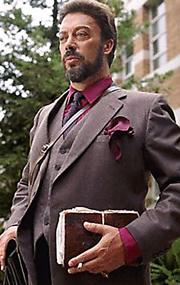Eugene Vandenberg

Cabirus of Pansophy
Description
~Shrewd and bright brown eyes evaluate the scenery with a jolly grin. Eugene Vandenberg pauses a moment to show off his tall, broad-shouldered stature enclosed in fine suits with eclectic nuances. Eugene’s features always remain neat and tidy, from his short brown hair to the frequent sporting of a well-groomed beard. Though this middle-aged gentleman appears to be a little overweight, Eugene exhibits all the qualities of a man of wealth and privilege. Still, he doesn’t carry on as if he thinks he were someone more special than he is. Eager to experience life, Eugene comes off as another fellow looking forward to karaoke night at an uptown bar.~
OOC: Appearance 2; Arcane 3

"Hmmm…! That sounds like fun. Let's try it!"

History
Feckless Youth
Eugene Vandenberg was born in 1638 with a silver spoon practically smelted into his genes. He belonged to a wealthy family ranked as viscounts in the Austrian Empire and dwelled in a grand house landed on an estate in the Swiss Alps’ lowlands. This became the canton of St. Gallen in modern times, not far from the city of Buchs. The beautiful, hilly domain was quintessential Swiss geography, and it was a wonderful place for Eugene and his sister, Roseli, to grow up, play in, and explore.
Wilhelm and Margarate, his parents (and with hired help), managed the estate and dealt in antiquities. The family (as the entire canton) remained Catholic, although the nobles received decent educations. Eugene’s education made him question the motives and doctrines of the papacy and church at large. Even so, changing his religion never felt like an option. He was content to dwell in the shadow of Catholicism. Perhaps because of this liberal attitude at home, or perhaps it was due to some congenital defect of the nobility, but Eugene was raised with rather lax moral rules. Maiming or killing other people never felt right to Eugene, but lying and cheating was never discouraged as he was raised. This laxness may also have contributed to his perverse attraction he had for Roseli, although it was an attraction he never acted upon.
As a noble youth, Eugene was ultimately rather spoiled. He received little guidance from his father, who was frequently away on acquisitions of foreign antiquities or marshaled to provide perimeter determent to foreign enemies (such as needed during the 30 Years’ War, when Switzerland remained characteristically neutral but vigilantly maintained its borders. He was also called to fight in the Swiss Peasant War in 1653, though the folk in his own land were relatively content with the viscount.). And Eugene’s mother doted much more on Roseli. Still, Eugene made friends easily, and always had a girlfriend to replace his unrealized fantasy of incest. His companions came from the servant household or even the peasantry of villages in the countryside.
The Viscount
When he became a man, as expected Eugene was issued into the army of the Tagsatzung. As a nobleman, an officer’s position was guaranteed. He applied himself where he excelled the most: logistics and strategy. He was no hero, and in fact disliked war and battle. He simply lacked the crusader’s zeal to fight to the death. A few skirmishes and minor engagements with remnants of the Prussian troops reinforced these beliefs about conflict. He never fled a field of battle, but neither did he ever lead a gallant charge.
And because of the young lieutenant’s undistinguished career, Eugene was released without concern when his father took ill in 1662. He hurried back home to take up a civilian life again to replace his father should the older Vandenberg succumb. Eugene hastily learned the tasks of stewardship and noble rule. His father’s retainers proved quite helpful in this regard. His mother was also helpful, albeit she was mainly trying to find a good wife for Eugene. Sensing his unnatural lust for Roseli, she was happily married years before while Eugene was deployed. Fortunately, after a few months of bedrest, Wilhelm Vandenberg recovered. Noting his son’s competent ability and intellect, he opted to retire anyway and pass the torch to the next generation.
So in 1663, Eugene’s tenure as Viscount of Vandenberg began. And he ruled well, keeping his lands within the canton simple and quiet. He cooperated with the church and avoided any conflicts whatsoever. He saw to the minimum number of troops required for the Tagsatzung and nothing more. Territorial and land disputes within his reach were settled with a diplomacy many came to respect.
The Collector
Meanwhile, he began to grow as fascinated with antiquities as his father was. This interest was born from the delivery of a rare Roman font thought to contain mystical powers of rejuvenation. It did not, of course, but it was inspiration. Eugene began to pour more and more effort into the study, search, and acquisition of antiquities, artifacts, and relics. Over nearly twenty years, Eugene acquired quite a collection of pieces. Where his father frequently donated lesser pieces to churches and charities, Eugene sold and auctioned most of his lesser finds to amass a greater fortune. But Eugene didn’t forget the shadow of the church, and donated some of his finds to the local clergy as bribes to simply leave him alone. Socially, Eugene was a very distant man in fact. He enjoyed a number of mistresses all over the canton, but lavished special attention only on Roseli. She was still happily married, however, and totally unresponsive. Das ist das leben.
With the realization that he might be alone forever, Eugene’s hunger for the wonders of the past became a more personal obsession. He began to embark on more journeys abroad as his father once did, particularly to Greece and Italy. He avoided the reach of the Ottoman Empire, more interested in the secrets of Hellenistic esotericism. Due to his nobility, while in Rome he was able to arrange a brief meeting with Pope Innocent XI himself. He took that opportunity to question his ideals about immortality with the leading medium to God. The pope’s reply was conventional and unmoving, and Eugene redoubled his searches. He began to believe that immortality was truly what God wanted for him. Finally in the personal museum of an Italian prince of Florence, he discovered a fragment of this quest. A fragile and torn old scroll written in ancient Greek contained the promise he sought, a promise the prince overlooked (perhaps he couldn’t translate the Greek as fluently as Eugene could).
For the next decade, Eugene scoured southern Europe for more knowledge of this “Spell of Life”. Tiny successes were aggregate, and he was starting to piece together more of the puzzle. This knowledge it seemed derive from ancient Hellenistic studies into “golden alchemy”, and that was born from Egyptian mysticism. Little did Eugene know that his gradually successful search drew the ire of Kindred scholars. Though he did not realize it, the undead dispatched one of their Archons to sabotage this “nosy mortal”, all with the pretense of protecting their Masquerade. This unnamed vampire snuck into his Nice apartment and stole all of Eugene’s notes and relics regarding the Spell of Life. Outraged, Eugene hired investigators and mounted a thorough search across southern France and northern Italy to no success.
The Spell of Life
Luckily, Eugene attracted the attention of more than the Kindred. The Cabiri also took note of Eugene’s explorations. In fact, a few of the clues he found were planted by this small faction of European “mummies”. Nikator introduced himself to Eugene bearing two gifts: Eugene’s collection of notes and antiquities, and a vanquished Archon with a stake through his heart. The vampire was left to the sun, Eugene was taken under wing. Ecstatic, the nobleman closely heeded Nikator’s instructions about the Rebirth, the history of the Reborn Dead, the dual nature of their souls, and the fundamental facts about their magic.
Eager to join the ranks of these Cabiri, Eugene impressed Nikator with his earnest pluck and easy mental grasp of these metaphysical secrets. Nikator agreed to help Eugene join the folds of the Reborn by means of the true Spell of Life, which only a few ancient Cabiri kept. He was given a year to get his affairs in order and prepare for a new existence…or finalize his will should anything go awry with the magic. Nikator figured this would also give Eugene plenty of time to back out if the man quailed, but Eugene could barely wait. He plenty of time to mull the decision and weigh the consequences, but found himself conscientiously content with the likely outcome of what the church would call “Satanism”.
Finally, in 1688 Eugene Vandenberg was ready to receive the Spell of Life. With Nikator’s guidance, he prepared a secluded chamber in the basement of his Swiss home. Nikator himself would be performing the ritual. The spell demanded 36 hours of constant chanting and meditation. Nikator was an old, powerful, and well-disciplined Cabirus sorcerer. To consummate the resonance of the ritual, Eugene was to consume a poisonous concoction brewed from an ancient Hellenistic formula. As he gasped out his last breath, Eugene focused his mind to reflect on how death felt. For being his final breath, he felt fantastically alive, very alive in fact. His soul was developing its distinguished binary nature, and super-charged with magical energy. He felt about as dead as a man having an orgasm.
Asphodel
And then the formal instruction began. Nikator passed on the history and truisms of the Cabiri and their mystical arts. These were monumental secrets that Eugene was learning, and an ancient secret society into which he was initiated. The period of Nikator’s direct mentorship was designed to especially cover Eugene’s passage onto his first full death and the recycle back to life. The magical path of Styxia (Necromancy) was emphasized. The arrangements of Eugene’s tomb – in the same basement chamber where the Spell of Life conceived his new existence – was also capitalized. Eugene was directed to initiate only a chosen few mortals into the secret of his new immortality, stewards who would ease the passage and prepare for their master’s return. Furthermore, these men would be entrusted and rewarded with the keeping of the estate and its titles during Eugene’s cyclical deaths. Stoffel Züblin was the direct descendant of the leading steward during Eugene’s father’s tenure, and could certainly be trusted. Eugene observed the demise of his parents and eventually even his younger sister. Their passing was inevitable and he accepted it with grim love. There was no point using up eternity in mourning, after all.
Eugene did not know when death would arrive, only that Nikator advised he would begin to feel death’s clammy grip. Indeed, through growing tiredness and ennui that nothing he did could dispel, Eugene recognized that coming demise. Nikator was there by his side to guide him through this experience. Unlike the ritual of the Spell of Life, this was not so comfortable. The sudden arrest of his heart and blackening of his consciousness was frightening.
But Eugene did open his eyes again, only to learn he wasn’t opening his eyes, but rather the eyes of his ghostly Psyche. He was now in Hades – the Underworld. Without dying – by a mastery of Styxia – Nikator released his own Psyche to guide Eugene there in the heart of Hades. A ferryboat with a silent and foreboding Ferryman ushered them both across a roiling sea to a quiet, empty glade of still grass and pale flowers – a “Far Shore” realm in the heart of Hades that the Cabiri called home, and named it Asphodel.
First Rebirth: Fledgling Learning
Here Nikator began Eugene’s instruction in the afterlife. He was taught that with concentration, he could shift his consciousness to a secondary soul that lingered in upper realm of Hades (the Shadowlands). This soul, the Eidolon, would watch over and protect his body while it rested and regenerated gradually for the next cycle of life. Nikator also strongly recommended that Eugene avoid the politics of Hades. He warned that the spirits of the Underworld were even more Machiavellian than mortals. The ruling government of the dead, Stygia, was heavily cracking down on all ghosts that did not fit their ironclad laws (and the Cabiri were thusly considered no better than Heretics). He advised Eugene to strengthen his Psyche through inner reflection alone, and at least wait until his skill with Styxia advanced before meddling with wraiths on any level.
This seemed like good advice for the fledgling mummy, and Eugene’s spiritual recharge thusly took years to complete. It demanded great patience from the young immortal, as he lingered solely in Asphodel. With only occasional visits from Nikator, the wait was nearly unbearable. Eugene swore that in future periods of death, he would not sit here like a well-behaved altar boy.
Eugene finally replenished the life-force of his Psyche by 1700 and with Nikator’s aid, completed his first resurrection. His souls recombined in his shell-like body and like a jolt of Frankenstein lightning, he was once more alive! He blinked his eyes back to life and stood right up. He was quite glad to be back, and handled the Rebirth just fine. He disliked the dreariness of Hades, so that motivation greatly helped. And he didn’t forget more than a few minor details of his youth so far. Nikator assured Eugene that that would change! The cycles of death and rebirth combined with centuries of long existence would erase many memories in time.
Spirit of the Era
As happy as he was to be alive again, Eugene knew he needed to spend the first several years of his renewed life to manage his estate. Stoffel proved an excellent choice as landlord, but it was a large estate and together Eugene and Stoffel chose a few more trustworthy men to hire on as retainers in keeping the estate in order. They weren’t told everything of course, but at least knew their master was not normal, and were paid well to stay silent. Nikator visited, too, once every five years or so. The two caught up and Nikator passed a few more secrets of Cabiri magic onto Eugene. Soon he realized what he owed his mentor in return: nothing more than his open-ended friendship. He was a modern connection for Nikator, a “spirit of the era”.
At the same time, Eugene eyed the rising tensions in Europe warily. The War of Spanish Succession was just winding down, but real peace was far off. He got an early start on pre-emptive diplomacy and generosity. Bribes and friendly summits hosted for the region’s noblemen helped blunt the rising animosity somewhat. But all of his efforts only blunted the inevitable that swept the entire continent – in fact, the world – in what became known as the War of Austrian Succession. It was all Eugene could do, even in Switzerland, to remain completely aloof and uninvolved. The Catholic Church called on all its electorates to aid with at least monies to back Austria and the Hapsburgs. And that was all Eugene offered. His first life was spent just to maintain his neutrality and control of his lands and wealth.
This lengthy life was extended in part by an idealistic hope that he could see through to the end of these conflicts. Few breaks in the violence afforded him a taste of life (and in each decade he enjoyed a different mistress). To keep his estate and his retainers in the style of life to which they were accustomed, Eugene was also forced to sell some of his prize antiquities – pieces his father even kept.
Ghost Hunters
Just as the War of Austrian Succession was tapering off around 1750, he felt the inexorable call of death again. Stoffel and his other retainers were ready to assist with his second entombment. His passage proceeded as smoothly and painlessly as the last time even without Nikator’s oversight. This time, he strayed from Asphodel. He was skilled enough in the art of Styxia to hold his own against the Restless Dead. So the Ferryman obliged him and took him across the Sunless Sea to a Stygian outpost on a tiny fragment of stability within the Tempest.
There he witnessed the sorrowful masses of the war-dead. Eugene refused to let their misery drag him down, however, and befriended a few more entrepreneurial wraiths. Conradus Ors was one of these shadowy spirits willing to help a stranger like Eugene for a price. In exchange for the promise to protect their Fetters once he returned to life, they agreed to partner up with him. Together, they started a business throughout the Underworld of hunting down lost Relics that were dropped in the vast, scary Tempest. They bartered this business for oboli (ghost money) or curried favors.
Within the vast Tempest, Eugene, Conradus, and the others recovered many of the possessions their clients requested. They often were forced to tangle with roving bands of spectres and malefic shades. Like the regular wraiths when their emotions got the better of their judgment, Eugene handled these hazards with noble aplomb. And his comparatively generous efforts to help the Restless in turn helped him. Within five years, his Psyche was totally recharged. He decided to make a habit of this “questing” during all of his cycles of death. Of course, Eugene was just lucky that Stygia was much too busy dealing with the hordes of new war-dead to worry about an oddball like a mummy.
Second Rebirth: Antiquities
Once Eugene was restored to life, he was gripped with the desire to continue his pursuit of antiquities in life again. This was in part spurred by his promise to Conradus and the others to protect their Fetters, for he would first have to gather their priceless possessions from around the world. In truth, a loss of memory of minor details of previous lives – such as his parents’ first names – also detached Eugene from his homestead. He left the Swiss estate in the hands of Stoffel and retainers and dove headfirst into this research.
He studied in public libraries of capital cities like Zurich and Vienna to gain starting points. And then he traveled throughout Europe to trade and acquire all the artifacts he could find, pausing to make side trips to find his dead friends’ Fetters. He dug up other antiquities from ruins, while others were obtained by hook or crook from churches and other nobles. He did not mind selling the lesser and unimportant pieces, for this helped rebuild his fortune. Without Nikator around to show him the ropes of magic, Eugene was especially on the hunt for mystical objects. Nikator did try to visit him during this period of twenty years or so, but always missed him. Eugene rarely returned to his Swiss home.
However, his explorations brought him into contact frequently less with magical talismans and more with supernatural creatures. As he wandered through ruins in the wilderness, those critters were often shapeshifting lycanthropes. Xenophobic and ferocious, it took all of Eugene’s calming diplomacy to assuage their suspicions. And it helped that Eugene did not abandon his humanity, and thus lacked Es -- the “taint”. So he managed to avoid serious conflict and fighting. He simply avoided any troublesome situations that negotiation could not avert. He embraced his immortality and remained patient – time was on his side.
Mirror of Amadeus
Or was it? Though he acquired a few useful token parchments that yielded lore to improve his mystical arts, it was very limited progress. Eugene became bored. Feeling his age beginning to catch up again and the lack of significant finds frustrating the Cabirus, Eugene returned to his Swiss estate at last. He largely stayed at home and decided to enjoy his long life. He held gallant parties and enjoyed the new sounds of music. He traveled to Vienna more than once to view Mozart and Beethoven. And Eugene certainly enjoyed his women. He had a special mistress in Vienna, Felicie Franz, who became his “spirit of the era”. She helped him connect to the passion felt in the music of this time. For fifteen years, interspersed with only a couple interludes of quiet (inspired by a couple of Nikator’s solemn visits), Eugene extended the last of his Psyche’s life force.
When Eugene finally perished for the third time, it was strangely coincidental with the exact date and time as the death of Wolfgang Amadeus Mozart. Stoffel, still alive (life extended by consuming some of Eugene’s health tonics) was ready to assist with the passage. In Hades, the Cabirus did not hesitate to pursue his relic-hunting business with Conradus. Unfortunately, the other ghosts in the group were gone, swallowed by Oblivion or simply moving on. So the business progressed slower than before, but his active behavior in the Underworld still recharged his Psyche within twenty years.
Third Rebirth: The Middle East
Eugene returned to life just after the end of the Napoleonic Wars in 1815. His lustful emotions that preceded the end of his previous life vanished so completely that he could not even recall his Vienna lover’s name. So he decided to just try again at building his collection of antiquities. He set forth over Europe again, especially the south. In fact, he boldly ventured into Turkey and Egypt, exploring the ruins of Troy and Alexandria. The early archaeologists of the 19th century helped brighten the way for a collector like Eugene.
And he began to amass much more lore from “confirmed hearsay” – that is, rumors and legends that church records and libraries confirmed with circumstantial evidence. Eugene began to piece together more secrets of the so-called Hidden World: the basic and fundamental facts of the nature of other supernatural beings such as vampires, werewolves, and faeries. While he delved into such lore, without even recalling the ennui he suffered at the end of the last life, he took pleasure in his travels. That pleasure certainly included its share of free women and courtesans! But he was laconic in those joys to avoid weakening his Psyche too soon. Consequently, his watchful travels abroad yielded him well over forty years of healthy existence.
In 1860, however, his pushy exploration ran him afoul of other supernatural entities in Egypt. An Ishmaelite mummy named Onipili Raz confronted the nosy European in Cairo. The two engaged in a fierce argument with veiled threats that somehow ended up with the pair in bed. They became fierce lovers, for while their goals differed, their means of avoidance and negotiation were similar. Perhaps that was why Onipili sided with Eugene when Followers of Set – evil vampires – came to punish the nosy interlopers. At first, a lovely Setite beauty tried to seduce the Cabirus, but Onipili held more sway over the man. Then four more attacked the two mummies. When vampiric powers only partially affected the two, the Setites suspected Reborn Dead. The two drove the coterie of Setites off with their potent magic.
Then Onipili insisted they flee Egypt together, but Eugene was hot on the trail of a pharaoh’s undiscovered tomb in Cairo itself. Onipili doubted the veracity of his research, since the dead kings were never buried in Cairo. Yet she accompanied Eugene into the tomb, and there they found a great hoard of relics and treasures. And they also found a Bane Mummy… This horrible demonic Reborn attacked the intruders, forcing them to battle for their very immortal souls. The battle ended when Eugene lured the Bane Mummy down the corridor and sprang one of the tomb’s ancient booby traps, dumping tons of massive stone bricks on the Bane Mummy’s head.
Pride in Death
But the last few years dried up the last reserves of his Psyche. Eugene needed to retreat to his home and prepare for his death. Grateful and admiring, Onipili gave him a protective amulet, a Lesser Soul Aegis, in case the Bane Mummy came after him in the future (after it regenerated its pulverized body, that was). Eugene reluctantly departed from his new lover and Egypt and went home. By this time, Stoffel had passed away. But the old retainer secured a trustworthy replacement, Gabëler Rosenberg. Gabëler helped his transition proceed peacefully in 1865.
Unfortunately, the Cabirus discovered that “Team Eugene” was gone. Even Conradus was nowhere to be found. He was forced to spend the new many years networking and befriending a new “generation” of wraiths. Of course, he discovered that alone seemed to replenish his Psyche. The leader of the ghosts he gathered to help him continue his Relic-finding business was more than able replacement for Conradus. Züsi Fels was a romantic beauty even in death, and despite a strong Psyche, Eugene lingered in her arms in the Underworld for decades.
Eventually, Nikator paid Eugene a visit in Hades. He warned that this would be his last visit to Eugene if the younger mummy did not get his act together. He expected Eugene to make himself worthy of immortality, even if all he ever did was collect antiquities. Ashamed, Eugene agreed and carefully broke off the romance from Züsi. He knew better than to jilt a wraith! And besides, she was much more useful to him as a friend than a lover.
Fourth Rebirth: Rise of Fascism
But by the time Eugene returned to life in 1895, he discovered Gabëler and most of his other retainers were gone. His home was in disarray. Worse, he forgot much from his life, including knowledge of some of his magic. Luckily, he kept a good journal detailing his life discoveries and experiences. Still, his fourth rebirth was off to a slow start, as he was obliged to stay home for a few years to clean up and study.
When he finally left to continue his pursuit of relics, he did not bother to hire any new stewards. His collection was safely kept in a hidden vault. He returned home sparingly to manage the estate, hiring only temporary help for simple clean up. Eugene ventured into more exotic locales, as far as Persia and Africa. He once again “danced” around supernatural foes and the terrible conflicts of the Great War, avoiding any threats he couldn’t talk his way past. He jumped on the archaeology bandwagon, learning much about ancient cultures and mysterious magic. (He wisely avoided Egypt even though he wondered about Onipili.) So what if he was less of a real scientist and more of a tomb robber?
Of course, the chance that he might be subject to similar lack of compunction didn’t cross his mind. His home always remained sacrosanct, but when he returned home in 1924, he discovered that the vault was broken into and his entire collection stolen. He was furious! But what could he do? He found that the thieves covered their tracks too well, and the temporary retainers were useless. To continue his explorations in the 30s, he was obliged to accept funding from the closest interested party: the Nazis. He was probing the ruins and wonders of the Near East, particularly Jerusalem. The Nazis wanted whatever holy relics he could find. He had no intention of surrendering the objects, but found none of significance anyway.
Separation of Church & State
As World War II loomed right around the corner, Eugene finally decided to return home and keep an eye on his ancestral estate. It was the viscount’s diplomacy and negotiations with St. Gallen’s Austrian neighbors that helped maintain Swiss neutrality. He otherwise managed his home, land, and the people that dwelled in the canton. The state was kept wealthy and peaceful, although it was a price paid in blood money. That fact bothered Eugene, and he grew disgusted and angry at the world at large. He began to take some of that frustration out on his stewards.
In return, these disloyal hirelings betrayed Eugene in the end even as the war was winding down. None of them were let in on the secret of his nature, but they nonetheless suspected “deviltry” in his life. He was reported to the Catholic Church as such in 1945. Under cover of punishing Nazi war crimes, the church dispatched elements of the Inquisition. They seized all of Eugene’s lands and assets. The few loyal servants were arrested and Eugene was cornered in his tomb. There they burnt him alive (so to speak), seizing his journal. Without screams of pain (thanks to a numbing tonic), Eugene cursed the bringers of this auto-da-fe with a promise that he would return. They took his threat seriously and after the fire, sanctified his ashes in the name of Christ.
Apparently, their faith was wanting. It would not prevent Eugene’s unnatural resurrection. But rebuilding his body from nothing would take far longer than normal. Furthermore, he would need his journal back, and concocted a risky gambit to that end. He called upon Züsi and all his other ghostly friends. The ghosts snuck into the local abbey. With their Arcanoi, they Inhabited (“possessed”) and destroyed his journal. As he hoped, the book’s significance allowed it to manifest in the Underworld as a functional Relic. He spent the next ten years copying the fragments of the journal back into a real form, courtesy of his necromantic arts and efforts of his Eidolon spirit. When he was ready to return to life, he reiterated his promise to Züsi and the others to watch over their Fetters.
Fifth Rebirth: Swiss-American
Fearing that the Inquisition would come after him again if he remained in Europe, and having no idea on how to restore his valuables (most were moved to the Vatican), Eugene decided to immigrate to America in 1955. He resolved to simply start over until other better opportunities were presented. He lived in New York City, working as an assistant curator at the Museum of Natural History. He forged his university credentials until he could earn his real ones, and attended NYU to do just that. He studied hard and pushed to acquire a doctorate in art history, with a focus on antiquities.
Meanwhile, Eugene restarted his personal collection of artifacts (including ghostly Fetters), often acquiring some at low-priced auction bids. With alchemy’s secrets of transmutations, he was able to multiply his wealth through wise investment. This time he did not trust his holdings to any stewards, vowing to never again hire retainers and to stay on the move. He would only arrange temporary tombs when death approached. By 1972, he achieved his full doctorate. Before he could capitalize on that credential in the city, run-ins with nosy vampire neighbors prompted him to simply move out.
In 1982, Eugene shifted to Chicago. Adapting to a mobile lifestyle made simply pulling up his roots that much easier. And Chicago had its own healthy realm of art and culture. He built back up both his wealth and knowledge. When trouble between supernatural factions began to loom in the city in the mid-90s, Eugene holed up in the sanctum and tomb in the basement of his modest brownstone home. He felt more morose than usual, hiding away and waiting to die.
But at least the death was quick and quiet. He acquainted the local wraiths, but soon discovered from this more immaterial vantage that the area was more of a mess of a shadow war than expected. To expedite his rebirth, Eugene took up the Relic-hunting business with local ghosts. But he kept his new partners at arm’s length, and this privacy was assuredly a great boon to avoid the turmoil in the Underworld, too.
Sixth Rebirth: Obscurity
Ten years later, Eugene regained the breath of life. He suffered little memory loss, and was ready to pick up and move again. This time he selected Kansas City, Missouri. His “career” as a collector was leading him to this earthy Midwest town because of its crossroads essence, and the promise for mystical discovery. Additional clues led him afar again, traveling all the way across the world to Durban, South Africa.
However, Eugene remained quiet and private and thus stayed under the radar to avoid the hazards of the Hidden World’s denizens. Eugene was displaying that a refusal to give up and that patience with the passage of centuries were his greatest assets. Like Lucifer, they would never see him coming.

Significant Other
Eugene moved in down the street from Daisy Aldred’s trailer home in the late summer of 2006. His much nicer home –- a mini-mansion really -– helped allure the underage teenage girl into his wiles. Much to his delight, he discovered Daisy was more than just a pretty face. She is what is known as a Pooka fae, and he’s eager to learn more about these critters. And his little "house cat" is content to just enjoy the high life with her new benefactor.
Inevitably, however, Daisy wandered off in 2009, as Pooka are apt to do. Eugene returned home one evening to find her closet empty (and a fair amount of silverware missing). Not to be outdone, he employed his dark arts to lure her back to his home, and back into his life she wandered. However, the magic was not a compelling geas, but rather a remote hypnotic suggestion, and she did not reappear until 2011 right before his move to Africa that she would accompany--and she was still the same spoiled cutie.

Daisy
Artifacts
Lesser Soul Aegis
Level: 3
Origin: From Onipili Raz, the Ishmaelite he helped and loved so many years ago, this was a parting gift to aid should he ever again run afoul of the Bane Mummy he dug up.
Description: This amulet is set in gold, crafted of green jade, and etched with the hieroglyphs representing Anubis.
Effects: 1) Provides a Ward rating of 4 against all effects that would target either the Eidolon or Psyche (particularly through Necromancy spells).
Activation: The amulet must be worn and it must be touching the flesh of the wearer to be effective.

Weakness
Dirty Old Man
Eugene revels in his immortality, and he squanders the gift quite selfishly. He flaunts human laws as he wishes while juggling useful if academic responsibilities with a constant flow of decadence.
Likelihood of Corruption
Average.
Eugene is well-educated on the nature of evil. Furthermore, he’s truly content with what he’s got. Still, this reveler can easily be led astray by his loins. (He’s fortunate that Daisy leans to her Unseelie nature but isn’t part of the Shadow Court.)

Links
Character Stats
Character Profiles
Deus Ex Machina
E-mail me!
Main Character Hub
Back to Game Hub
 |
 |









